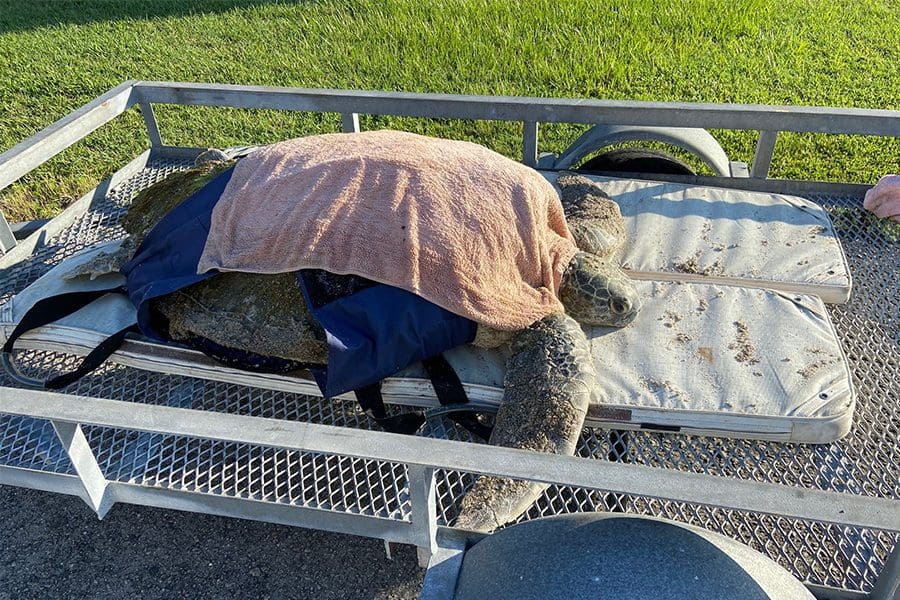

Rock-Sea was loaded onto a trailer after being found at Cape Canaveral Space Force Station last week. Photo by Angy Chambers.
One hundred sick or injured green sea turtles have come for treatment at our Sea Turtle Healing Center this year. To put that in perspective, we’ve never taken in over 100 patients—no matter the species—in any given year. And it’s only September.
Our 100th patient came with a unique story. Although the ending is not what we had hoped for, we want to share how several organizations within our community stepped up to help Rock-Sea.
On the morning of September 15, an adult green sea turtle was found at Cape Canaveral Space Force Station by Space Launch Delta 45, Civil Engineering Squadron, Environmental Conservation Element (activities conducted under permit number MTP#075) during seasonal sea turtle nest surveys. Due to the size of the marine reptile, multiple members of the group helped lift and secure the sea turtle to a trailer using a sling and boat cushions. Under the authorization of Florida Fish and Wildlife Conservation Commission, the group then transported the patient to our Healing Center.
Upon arrival, our team immediately noticed that the sea turtle—who weighed just under 250 lbs.—appeared to have severe dystocia, which means that she had eggs but was unable to lay them. Our veterinary team began normal intake procedures, which include a blood draw and radiographs.
A CT scan was determined to be necessary to find out if the eggs were impacted due to a physical obstruction. Despite the regular and critical need for CT scans by our patients, the Healing Center does not have this machine onsite. Our staff called Rockledge Regional Medical Center (RRMC), who graciously squeezed her in for an emergency CT scan just hours after the sea turtle’s arrival. She was named “Rock-Sea” by RRMC staff.
While Rock-Sea was at RRMC, her bloodwork was rushed to Steward Reference Labs for processing. The bloodwork revealed that she was in renal failure as her kidneys were not working properly.
The CT scan was sent to Dr. Watson, DVM, MS, DACVR, owner of Veterinary Forensic Imaging Consultants, for expedited results. Although a scan showed a malformation of the bottom of Rock-Sea’s spine, Dr. Watson didn’t believe the malformation or a neurological issue caused the egg impaction. It was also confirmed that there was no physical obstruction blocking the passage of her eggs.
Due to the associated risks, we made the decision not to induce Rock-Sea while she was in renal failure and instead focused on giving her supportive care such as fluids to help her kidneys recover. Unfortunately, two days after intake, Rock-Sea succumbed to her ailments.
While this is not the outcome we wanted, we are so grateful to our partners in the community for helping give Rock-Sea the best possible chance at recovery. As we do with all our patients, we will learn from her story so that we can better care for sea turtles in the future.
The Sea Turtle Healing Center cares for sick or injured sea turtles found primarily along the nearby Florida coast. While this facility is not open to the public, the effects of its work impact local sea turtle populations. An in-county facility means a shorter drive for patients, resulting in less stress and quicker treatment for distressed turtles.
Have you found a sea turtle that needs help? Visit this page or call the Sea Turtle Preservation Society at 321-206-0646.
Want to help the Sea Turtle Healing Center? Support our Zoo, or view our Healing Center’s wishlist.
